Why Growing Your Own Organic Basil Plant is a Game-Changer
Imagine stepping into your kitchen, plucking fresh basil leaves from your own plant, and adding them to your favorite dishes. The aroma, the flavor, and the satisfaction of knowing it’s 100% organic—priceless. Growing your own organic basil plant isn’t just a hobby; it’s a lifestyle choice that brings health, savings, and joy into your life.
In this article, we’ll explore five powerful reasons why growing your own organic basil plant is worth the effort. From health benefits to cost savings, eco-friendliness, and culinary delights, you’ll discover why this humble herb deserves a spot in your home or garden.
Table of Contents
1. Health Benefits of Organic Basil: Why It’s Worth the Effort
Rich in Nutrients and Antioxidants
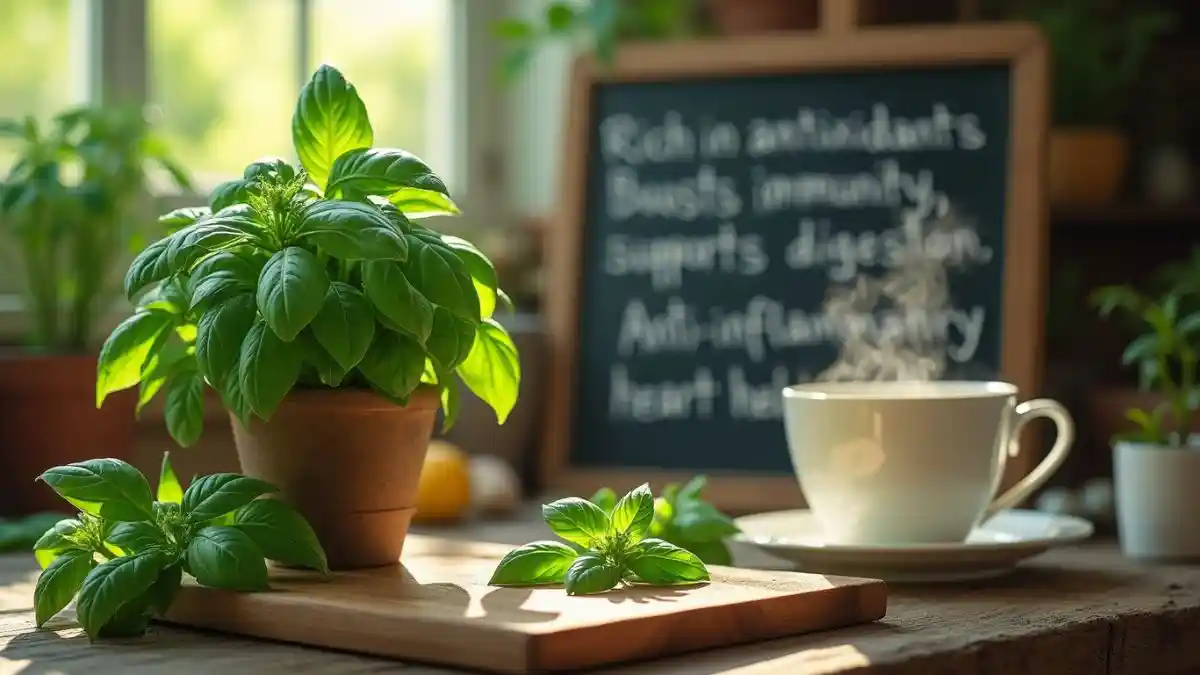
Basil isn’t just a flavorful herb; it’s a nutritional powerhouse. Packed with vitamins A, K, and C, as well as antioxidants like flavonoids and polyphenols, basil helps combat free radicals in your body. These antioxidants are essential for lowering inflammation and protecting against long-term illnesses.
When you grow your own organic basil plant, you ensure that your herbs are free from harmful pesticides and chemicals. This means you’re consuming a cleaner, healthier product that supports your overall well-being.
Boosts Immunity and Reduces Stress
Basil is known for its antibacterial and antiviral properties, making it a natural ally for your immune system. Additionally, basil contains adaptogens, which help your body manage stress more effectively.
Imagine sipping on a cup of basil tea after a long day. The calming aroma and soothing properties can help you unwind and relax. Growing your own organic basil plant ensures you always have this natural remedy at your fingertips.
Supports Digestive Health
Basil has been used for centuries to aid digestion and reduce bloating. Whether you add fresh basil leaves to your meals or brew them into a tea, this herb can help soothe your digestive system and promote gut health.
Anti-Inflammatory Properties
Basil contains essential oils like eugenol, which have anti-inflammatory effects. This can be especially helpful for people dealing with conditions such as arthritis or inflammatory bowel disease.
Promotes Heart Health
Basil is rich in magnesium, which helps relax blood vessels and improve blood flow. This can help reduce blood pressure and support better heart health.
2. Cost-Effective: Save Money by Growing Your Own Basil
Compare Store-Bought vs. Home-Grown Basil
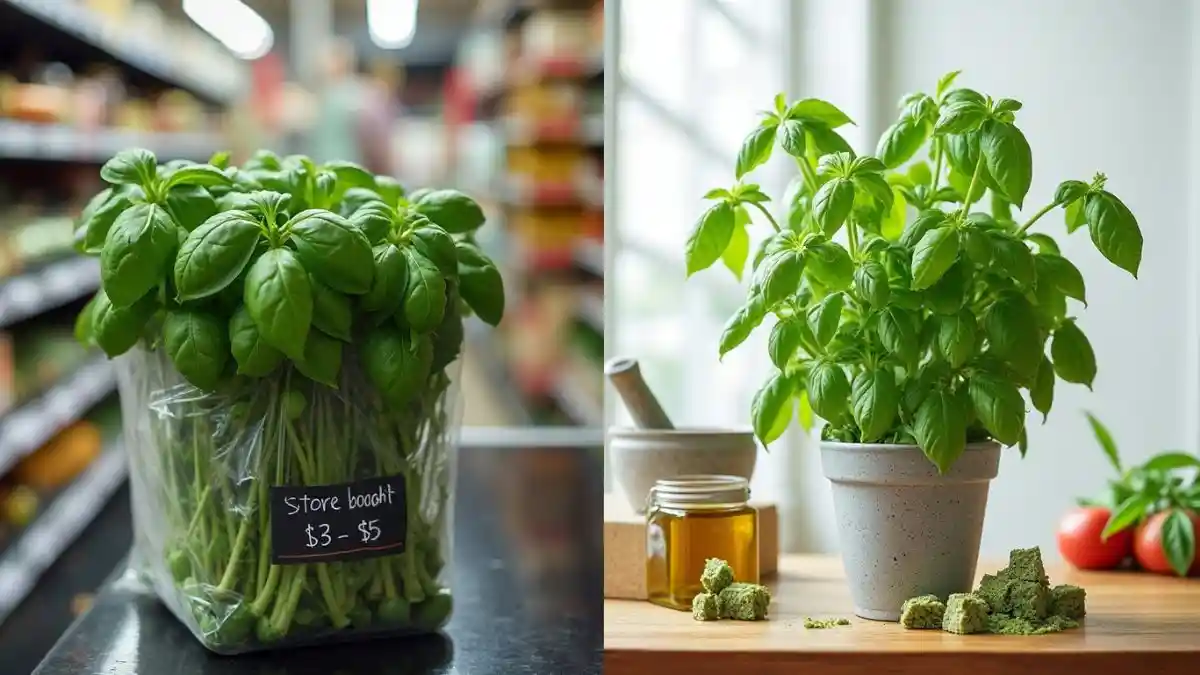
Let’s face it, buying fresh organic basil from the store can be expensive. A small bunch can cost anywhere from 3 to 5, and it often goes bad before you can use it all. On the other hand, growing your own organic basil plant costs just a few dollars for seeds and soil, and it provides a continuous supply of fresh leaves.
Here’s a quick comparison:
| Aspect | Store-Bought Basil | Home-Grown Basil |
| Cost per bunch | 3−3−5 | $0.50 (seed cost) |
| Freshness | Limited shelf life | Fresh on demand |
| Organic Certification | Often expensive | Guaranteed organic |
Long-Term Savings
A single basil plant can yield multiple harvests throughout the growing season. With proper care, you can enjoy fresh basil for months without spending a dime at the store. Plus, you can preserve your basil by freezing it in olive oil or making homemade pesto, ensuring you have a supply year-round.
Reduces Food Waste
When you grow your own basil, you only harvest what you need, reducing the likelihood of food waste. This helps cut costs while also promoting a more eco-friendly way of living.
3. Eco-Friendly: Reduce Your Carbon Footprint
No Plastic Packaging
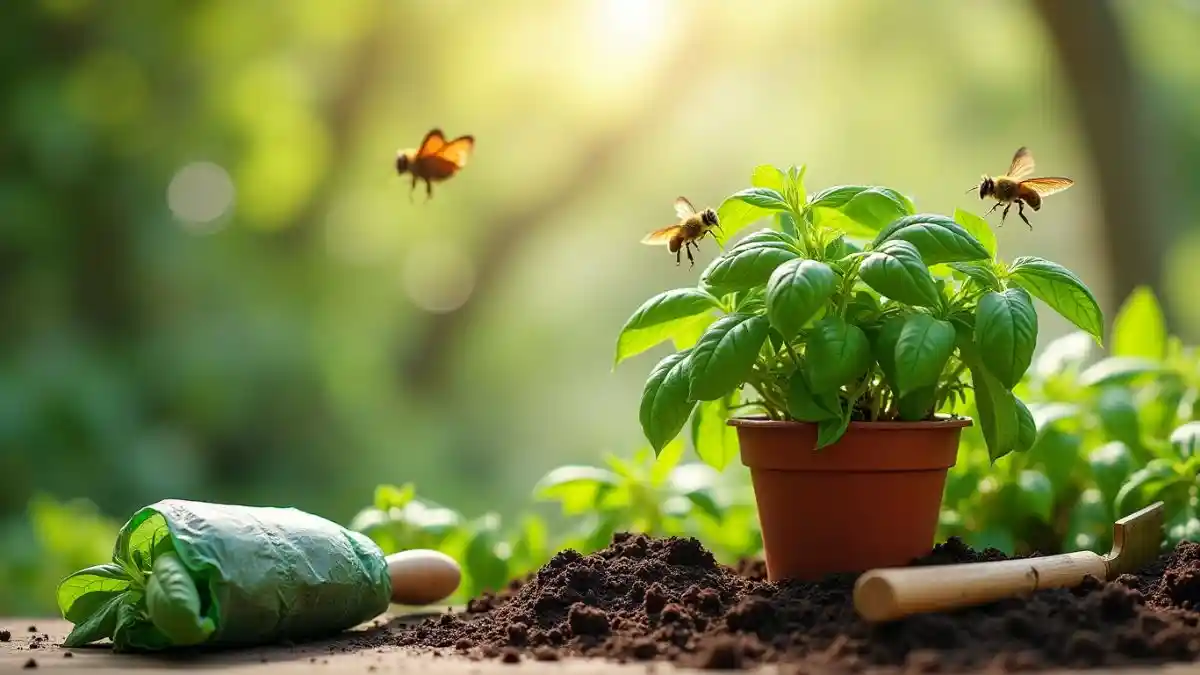
Store-bought herbs often come in plastic packaging, which contributes to environmental waste. By growing your own organic basil plant, you eliminate the need for single-use plastics and reduce your carbon footprint.
Sustainable Gardening Practices
Organic gardening promotes sustainability. By applying compost and organic fertilizers, you improve soil quality in an eco-friendly way. Plus, growing your own herbs reduces the transportation emissions associated with store-bought produce.
Support Biodiversity
Basil plants attract pollinators like bees and butterflies to your garden, supporting local biodiversity. By growing organic basil, you’re contributing to a healthier ecosystem.
Reduces Chemical Runoff
Conventional farming often involves the use of synthetic pesticides and fertilizers, which can runoff into waterways and harm aquatic life. By growing your own organic basil, you’re helping to reduce this chemical runoff.
4. Culinary Delight: Elevate Your Cooking with Fresh Basil
Recipes to Try with Your Home-Grown Basil
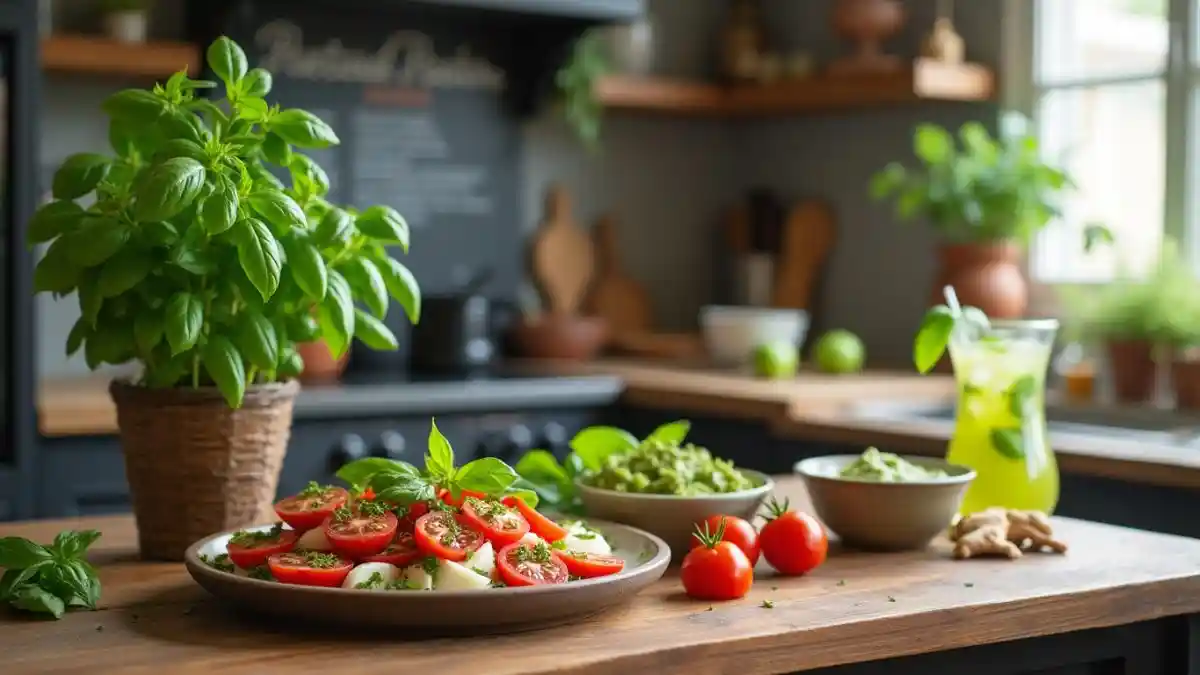
Fresh basil can transform ordinary dishes into culinary masterpieces. Here are some recipes you can experiment with:
| Recipe | Ingredients |
| Caprese Salad | Fresh basil, tomatoes, mozzarella, olive oil |
| Pesto Sauce | Basil, pine nuts, garlic, Parmesan, olive oil |
| Basil Lemonade | Basil leaves, lemon, honey, water |
| Basil-Infused Oil | Basil leaves, olive oil, garlic |
Flavor Comparison: Fresh vs. Dried Basil
While dried basil has its uses, nothing compares to the vibrant flavor of fresh basil. Whether you’re making a salad, pasta, or soup, fresh basil adds a burst of aroma and taste that dried herbs simply can’t match.
Creative Uses for Basil
Don’t limit basil to savory dishes. Try adding it to smoothies for a fresh twist or using it in desserts like basil sorbet or basil-infused ice cream.
Enhances Global Cuisines
Basil is a staple in many global cuisines, from Italian pesto to Thai curries. Growing your own organic basil plant allows you to experiment with these diverse culinary traditions.
5. Therapeutic Gardening: The Joy of Growing Your Own Basil
Stress Relief and Mental Well-Being
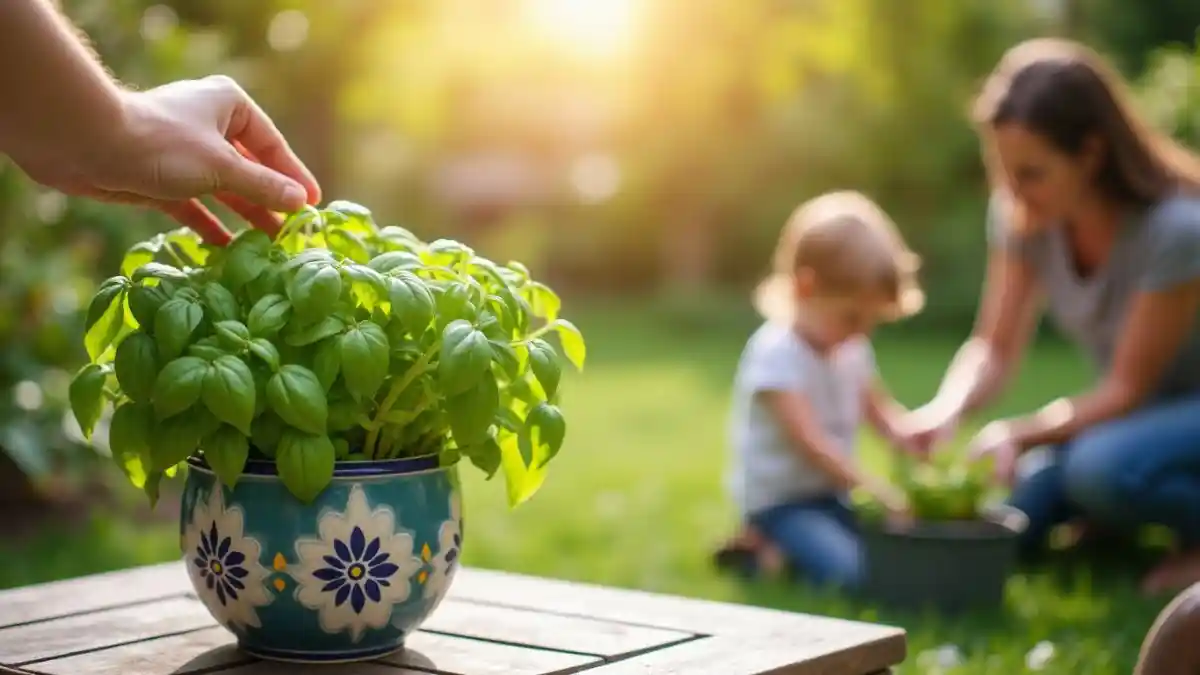
Gardening is a proven stress reliever. The act of nurturing a plant, watching it grow, and harvesting its leaves can be incredibly satisfying. Growing your own organic basil plant provides a sense of accomplishment and joy.
Educational for Kids and Families
Gardening is a great way to teach kids about responsibility, patience, and the science of plant growth. It’s also a fun activity for families to bond over and enjoy together.
Aesthetic Appeal
Basil plants add greenery and beauty to your home or garden. Whether you grow them in pots on your balcony or in a garden bed, they enhance the visual appeal of your space.
Encourages Mindfulness
Gardening encourages you to slow down and be present in the moment. This mindfulness can have a positive impact on your mental health and overall well-being.
Growing Your Own Organic Basil: A Simple Step-by-Step Guide
Choosing the Right Basil Variety
There are many basil varieties to choose from, including Sweet Basil, Genovese Basil, Thai Basil, and Lemon Basil. Select a variety that suits your culinary preferences and growing conditions.
Planting and Care Tips
- Use organic soil and seeds.
- Ensure your basil plant gets 6-8 hours of sunlight daily.
- Water consistently but avoid overwatering.
Common Pests and How to Manage Them Organically
- Treat aphids with neem oil or insecticidal soap.
- Companion planting with marigolds can deter pests.
Harvesting and Pruning
- Pick basil leaves frequently to promote fuller, bushier growth.
- Prune the plant to prevent it from flowering too early, which can reduce leaf production.
Conclusion: Start Your Organic Basil Journey Today
Growing your own organic basil plant is a simple yet powerful way to enhance your health, save money, and contribute to a greener planet. It’s a rewarding experience that brings joy, flavor, and sustainability to your life.
So, what are you waiting for? Start your organic basil journey today and enjoy the countless benefits of this amazing herb. Share your basil-growing journey with us in the comments or tag us on social media!
FAQ Section
- How do I start growing an organic basil plant?
Pick basil leaves frequently to promote fuller, bushier growth. Water regularly and avoid over-fertilizing. - How much time is needed for basil to grow?
Basil typically takes 5-10 days to germinate and 3-4 weeks to grow harvestable leaves. - Can I grow basil indoors?
Yes, basil thrives indoors with adequate sunlight or grow lights. - What are the best companion plants for basil?
Basil grows well alongside tomatoes, peppers, and oregano. - How frequently should I water my organic basil plant?
Water the plant when the top inch of soil becomes dry, typically every 2 to 3 days. - Can I grow basil from cuttings?
Yes, place basil cuttings in water until roots form, then transplant them into soil. - What’s the best way to store fresh basil?
Keep basil fresh by placing it in a glass of water on the counter or preserve it by freezing it in olive oil. - Why are my basil leaves turning yellow?
Yellow leaves can indicate overwatering, poor drainage, or nutrient deficiency. - Can I grow basil year-round?
Yes, with proper care and indoor growing conditions, basil can thrive year-round. - What’s the difference between organic and non-organic basil?
Organic basil is grown without synthetic pesticides or fertilizers, making it safer and more environmentally friendly. - How do I prevent my basil plant from flowering too early?
Regularly prune the top leaves to encourage bushier growth and delay flowering. - What’s the best soil for growing organic basil?
Opt for soil that drains well, is rich in nutrients, and has a pH level ranging from 6.0 to 7.5. - Can I grow basil in a small space?
Absolutely! Basil grows well in containers, making it perfect for small spaces like balconies or windowsills. - How do I make basil tea?
Soak fresh basil leaves in hot water for about 5 to 10 minutes, Enhance the taste by adding honey or a splash of lemon. - How can you tell if a basil plant is being overwatered?
Yellowing leaves, drooping, and root rot are typical indicators of too much water.


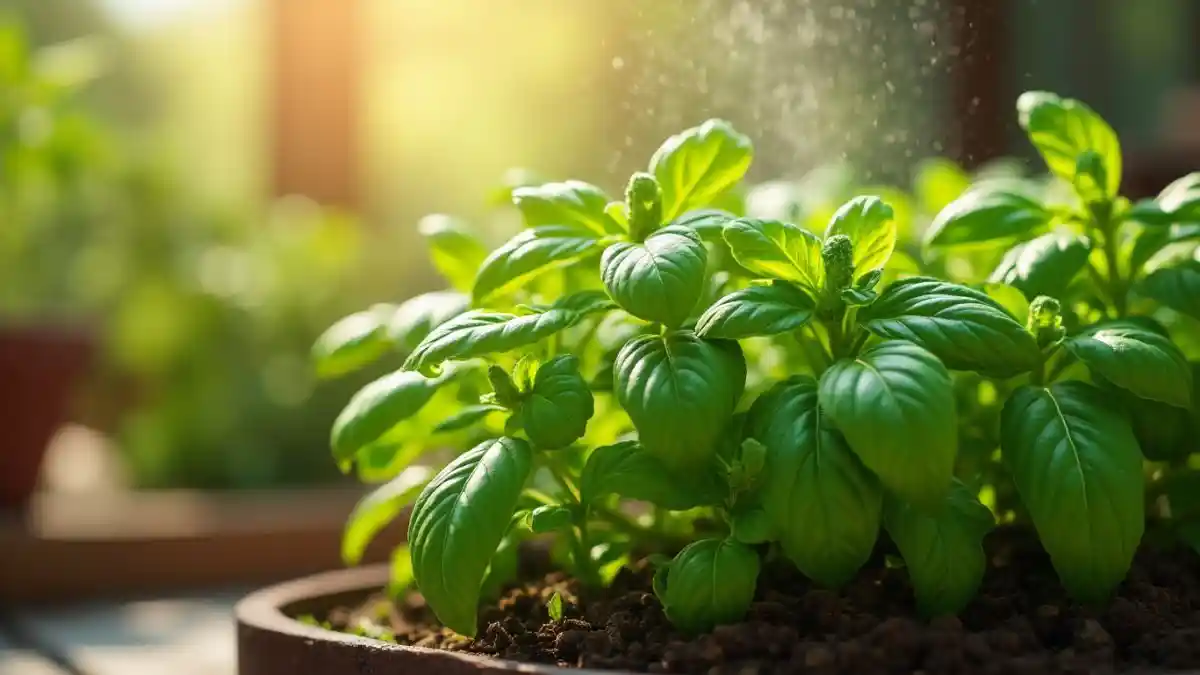
1 thought on “Organic Basil Plant: 5 Powerful Reasons to Grow Your Own”